Comprehensive Report on Ethical Principles and Practices in Dentistry
VerifiedAdded on 2020/11/12
|6
|1566
|300
Report
AI Summary
This report provides a detailed overview of ethics in dentistry, encompassing the systematization, defending, and recommending concepts of right and wrong within the profession. It explores the importance of ethical norms in providing correct treatment and fostering positive dentist-patient relationships. The report covers various codes of ethics, emphasizing the commitment of oral health professionals to high ethical standards, including promoting the profession, providing quality services, and conducting research. It further examines bioethics principles such as respect for autonomy, non-maleficence, beneficence, and justice, highlighting their application in dental practice. The report also discusses the dentist-patient relationship, emphasizing trust, honesty, and respect as crucial elements for effective treatment. Furthermore, it references relevant laws and regulations, underscoring the importance of ethical conduct in the dental field.
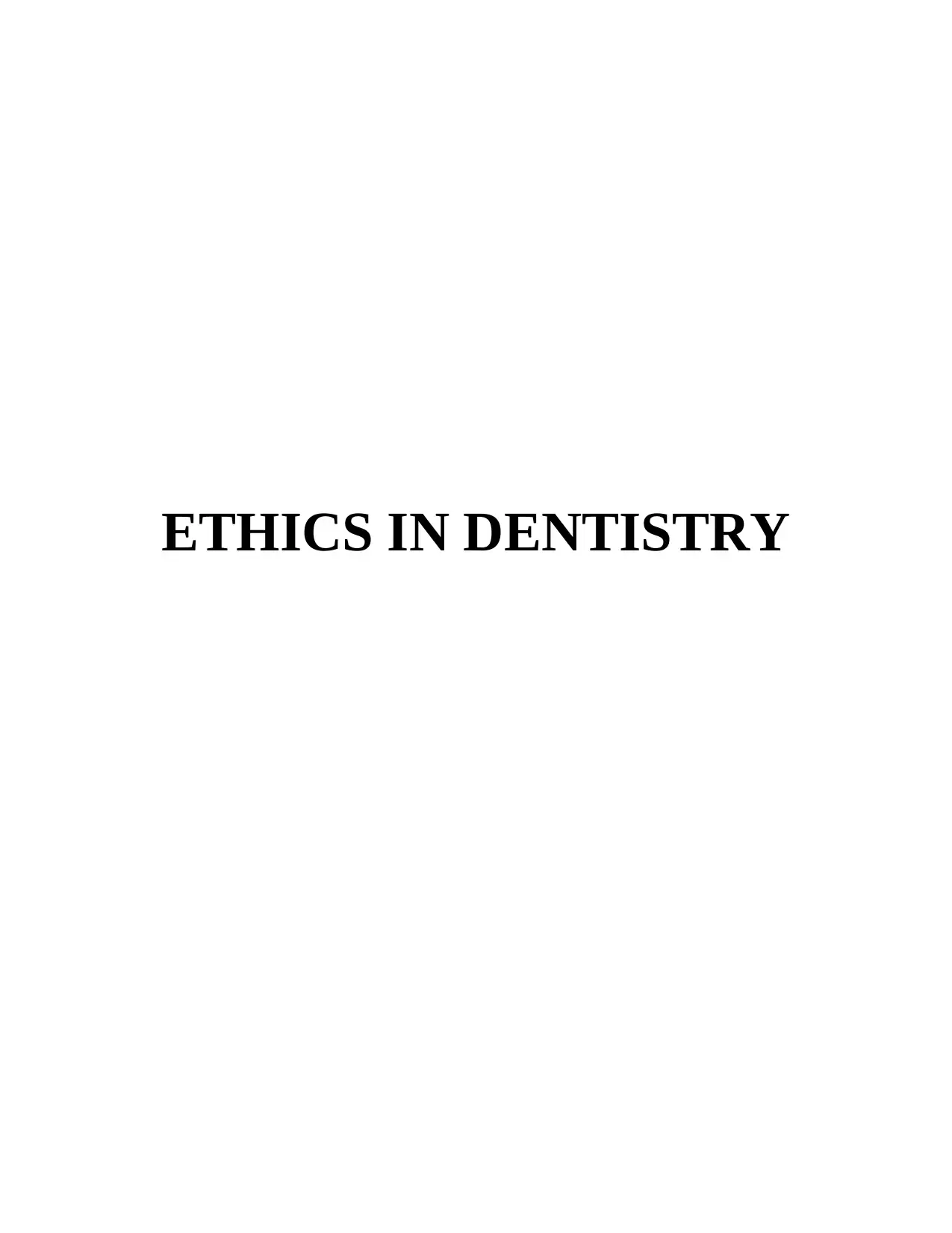
ETHICS IN DENTISTRY
Paraphrase This Document
Need a fresh take? Get an instant paraphrase of this document with our AI Paraphraser

Table of Contents
INTRODUCTION...........................................................................................................................1
MAIN BODY...................................................................................................................................1
CONCLUSION................................................................................................................................3
REFERENCES................................................................................................................................4
INTRODUCTION...........................................................................................................................1
MAIN BODY...................................................................................................................................1
CONCLUSION................................................................................................................................3
REFERENCES................................................................................................................................4
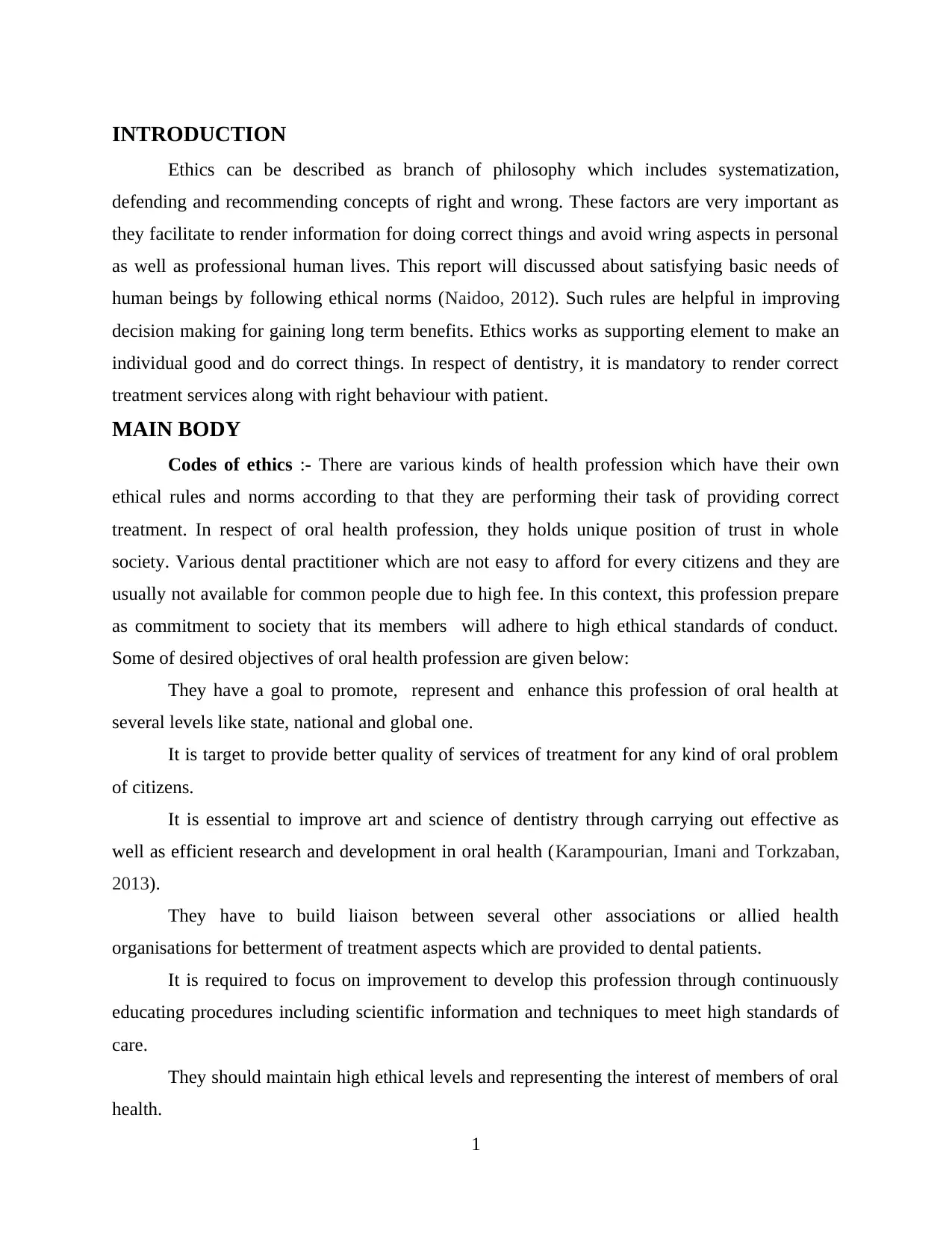
INTRODUCTION
Ethics can be described as branch of philosophy which includes systematization,
defending and recommending concepts of right and wrong. These factors are very important as
they facilitate to render information for doing correct things and avoid wring aspects in personal
as well as professional human lives. This report will discussed about satisfying basic needs of
human beings by following ethical norms (Naidoo, 2012). Such rules are helpful in improving
decision making for gaining long term benefits. Ethics works as supporting element to make an
individual good and do correct things. In respect of dentistry, it is mandatory to render correct
treatment services along with right behaviour with patient.
MAIN BODY
Codes of ethics :- There are various kinds of health profession which have their own
ethical rules and norms according to that they are performing their task of providing correct
treatment. In respect of oral health profession, they holds unique position of trust in whole
society. Various dental practitioner which are not easy to afford for every citizens and they are
usually not available for common people due to high fee. In this context, this profession prepare
as commitment to society that its members will adhere to high ethical standards of conduct.
Some of desired objectives of oral health profession are given below:
They have a goal to promote, represent and enhance this profession of oral health at
several levels like state, national and global one.
It is target to provide better quality of services of treatment for any kind of oral problem
of citizens.
It is essential to improve art and science of dentistry through carrying out effective as
well as efficient research and development in oral health (Karampourian, Imani and Torkzaban,
2013).
They have to build liaison between several other associations or allied health
organisations for betterment of treatment aspects which are provided to dental patients.
It is required to focus on improvement to develop this profession through continuously
educating procedures including scientific information and techniques to meet high standards of
care.
They should maintain high ethical levels and representing the interest of members of oral
health.
1
Ethics can be described as branch of philosophy which includes systematization,
defending and recommending concepts of right and wrong. These factors are very important as
they facilitate to render information for doing correct things and avoid wring aspects in personal
as well as professional human lives. This report will discussed about satisfying basic needs of
human beings by following ethical norms (Naidoo, 2012). Such rules are helpful in improving
decision making for gaining long term benefits. Ethics works as supporting element to make an
individual good and do correct things. In respect of dentistry, it is mandatory to render correct
treatment services along with right behaviour with patient.
MAIN BODY
Codes of ethics :- There are various kinds of health profession which have their own
ethical rules and norms according to that they are performing their task of providing correct
treatment. In respect of oral health profession, they holds unique position of trust in whole
society. Various dental practitioner which are not easy to afford for every citizens and they are
usually not available for common people due to high fee. In this context, this profession prepare
as commitment to society that its members will adhere to high ethical standards of conduct.
Some of desired objectives of oral health profession are given below:
They have a goal to promote, represent and enhance this profession of oral health at
several levels like state, national and global one.
It is target to provide better quality of services of treatment for any kind of oral problem
of citizens.
It is essential to improve art and science of dentistry through carrying out effective as
well as efficient research and development in oral health (Karampourian, Imani and Torkzaban,
2013).
They have to build liaison between several other associations or allied health
organisations for betterment of treatment aspects which are provided to dental patients.
It is required to focus on improvement to develop this profession through continuously
educating procedures including scientific information and techniques to meet high standards of
care.
They should maintain high ethical levels and representing the interest of members of oral
health.
1
⊘ This is a preview!⊘
Do you want full access?
Subscribe today to unlock all pages.

Trusted by 1+ million students worldwide
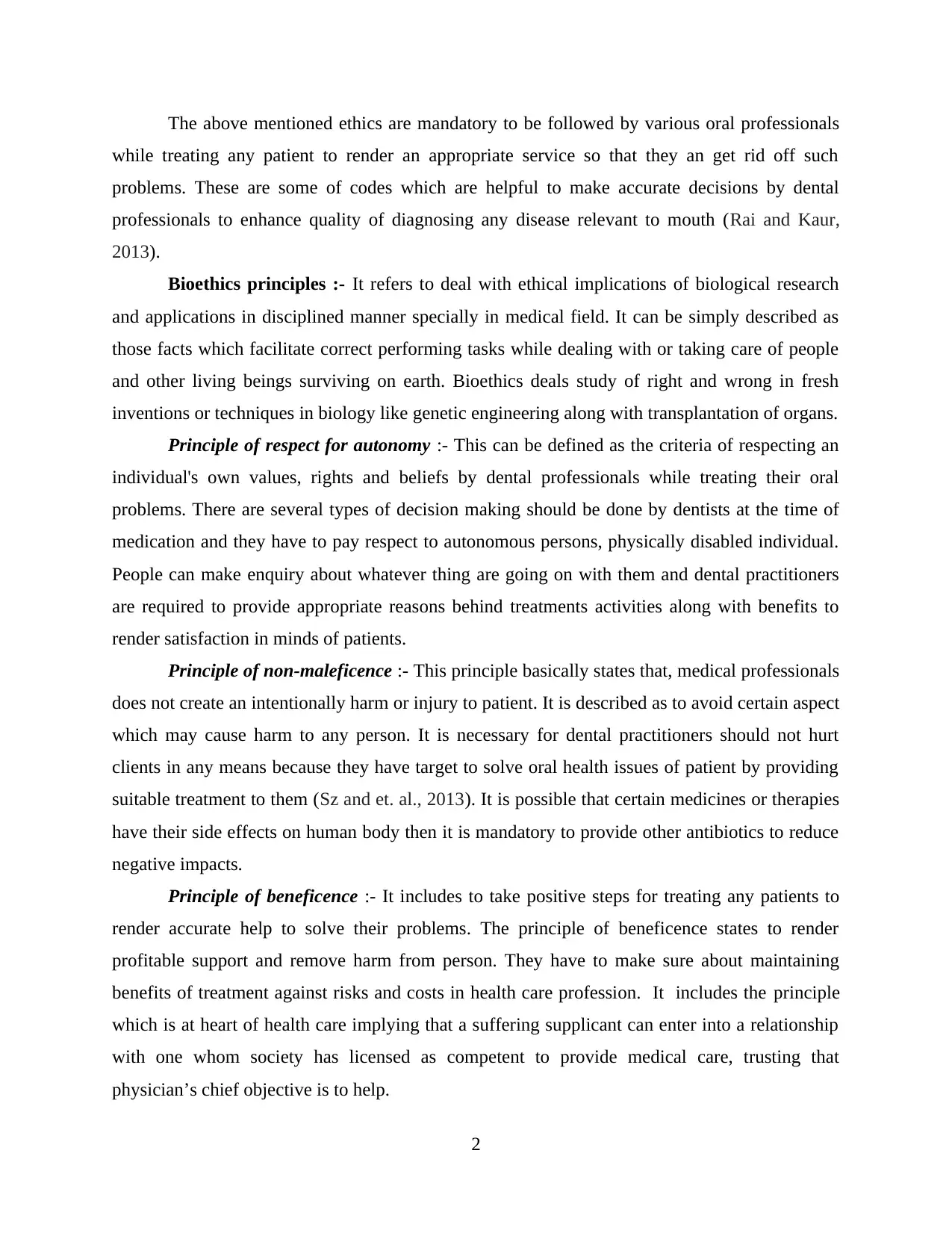
The above mentioned ethics are mandatory to be followed by various oral professionals
while treating any patient to render an appropriate service so that they an get rid off such
problems. These are some of codes which are helpful to make accurate decisions by dental
professionals to enhance quality of diagnosing any disease relevant to mouth (Rai and Kaur,
2013).
Bioethics principles :- It refers to deal with ethical implications of biological research
and applications in disciplined manner specially in medical field. It can be simply described as
those facts which facilitate correct performing tasks while dealing with or taking care of people
and other living beings surviving on earth. Bioethics deals study of right and wrong in fresh
inventions or techniques in biology like genetic engineering along with transplantation of organs.
Principle of respect for autonomy :- This can be defined as the criteria of respecting an
individual's own values, rights and beliefs by dental professionals while treating their oral
problems. There are several types of decision making should be done by dentists at the time of
medication and they have to pay respect to autonomous persons, physically disabled individual.
People can make enquiry about whatever thing are going on with them and dental practitioners
are required to provide appropriate reasons behind treatments activities along with benefits to
render satisfaction in minds of patients.
Principle of non-maleficence :- This principle basically states that, medical professionals
does not create an intentionally harm or injury to patient. It is described as to avoid certain aspect
which may cause harm to any person. It is necessary for dental practitioners should not hurt
clients in any means because they have target to solve oral health issues of patient by providing
suitable treatment to them (Sz and et. al., 2013). It is possible that certain medicines or therapies
have their side effects on human body then it is mandatory to provide other antibiotics to reduce
negative impacts.
Principle of beneficence :- It includes to take positive steps for treating any patients to
render accurate help to solve their problems. The principle of beneficence states to render
profitable support and remove harm from person. They have to make sure about maintaining
benefits of treatment against risks and costs in health care profession. It includes the principle
which is at heart of health care implying that a suffering supplicant can enter into a relationship
with one whom society has licensed as competent to provide medical care, trusting that
physician’s chief objective is to help.
2
while treating any patient to render an appropriate service so that they an get rid off such
problems. These are some of codes which are helpful to make accurate decisions by dental
professionals to enhance quality of diagnosing any disease relevant to mouth (Rai and Kaur,
2013).
Bioethics principles :- It refers to deal with ethical implications of biological research
and applications in disciplined manner specially in medical field. It can be simply described as
those facts which facilitate correct performing tasks while dealing with or taking care of people
and other living beings surviving on earth. Bioethics deals study of right and wrong in fresh
inventions or techniques in biology like genetic engineering along with transplantation of organs.
Principle of respect for autonomy :- This can be defined as the criteria of respecting an
individual's own values, rights and beliefs by dental professionals while treating their oral
problems. There are several types of decision making should be done by dentists at the time of
medication and they have to pay respect to autonomous persons, physically disabled individual.
People can make enquiry about whatever thing are going on with them and dental practitioners
are required to provide appropriate reasons behind treatments activities along with benefits to
render satisfaction in minds of patients.
Principle of non-maleficence :- This principle basically states that, medical professionals
does not create an intentionally harm or injury to patient. It is described as to avoid certain aspect
which may cause harm to any person. It is necessary for dental practitioners should not hurt
clients in any means because they have target to solve oral health issues of patient by providing
suitable treatment to them (Sz and et. al., 2013). It is possible that certain medicines or therapies
have their side effects on human body then it is mandatory to provide other antibiotics to reduce
negative impacts.
Principle of beneficence :- It includes to take positive steps for treating any patients to
render accurate help to solve their problems. The principle of beneficence states to render
profitable support and remove harm from person. They have to make sure about maintaining
benefits of treatment against risks and costs in health care profession. It includes the principle
which is at heart of health care implying that a suffering supplicant can enter into a relationship
with one whom society has licensed as competent to provide medical care, trusting that
physician’s chief objective is to help.
2
Paraphrase This Document
Need a fresh take? Get an instant paraphrase of this document with our AI Paraphraser
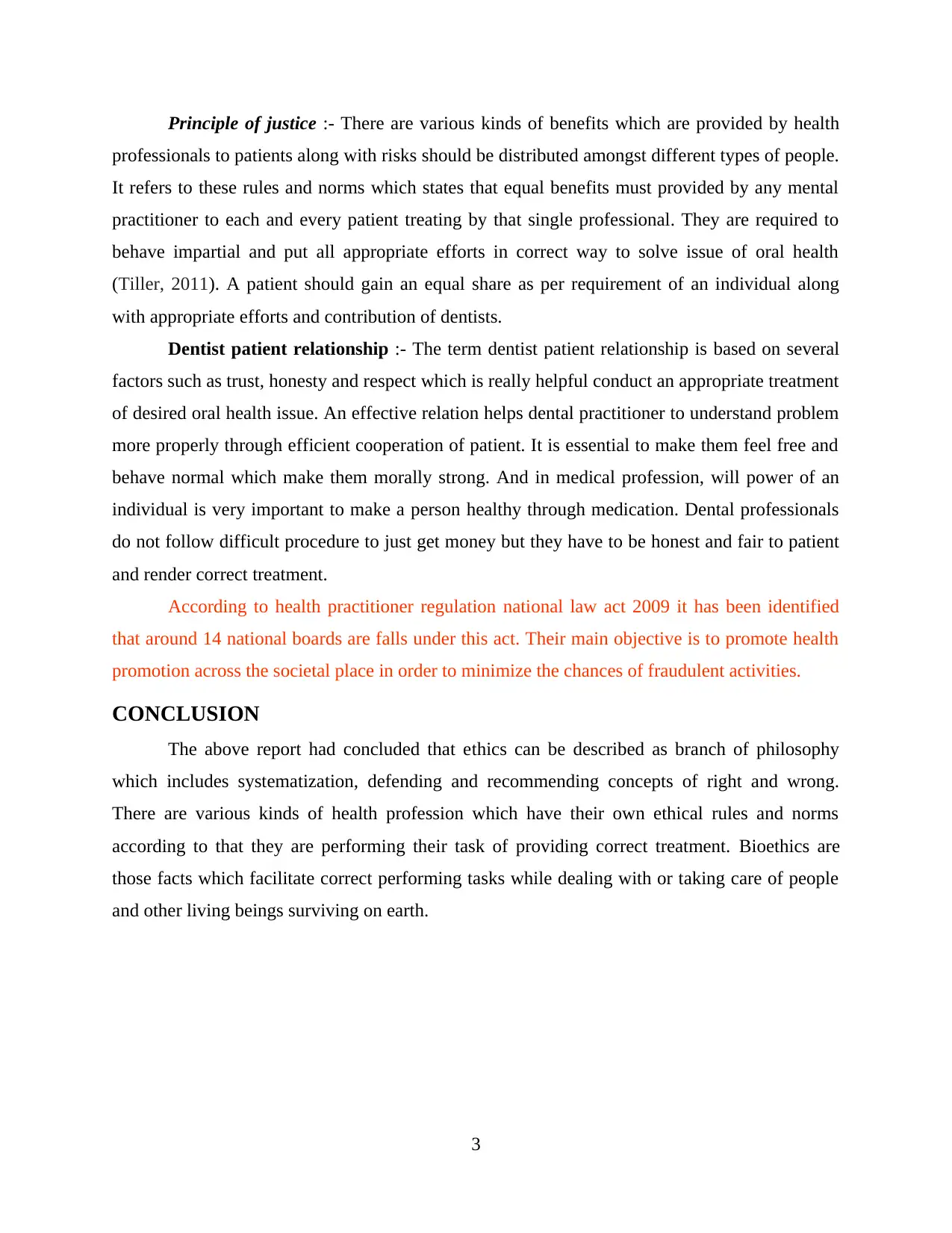
Principle of justice :- There are various kinds of benefits which are provided by health
professionals to patients along with risks should be distributed amongst different types of people.
It refers to these rules and norms which states that equal benefits must provided by any mental
practitioner to each and every patient treating by that single professional. They are required to
behave impartial and put all appropriate efforts in correct way to solve issue of oral health
(Tiller, 2011). A patient should gain an equal share as per requirement of an individual along
with appropriate efforts and contribution of dentists.
Dentist patient relationship :- The term dentist patient relationship is based on several
factors such as trust, honesty and respect which is really helpful conduct an appropriate treatment
of desired oral health issue. An effective relation helps dental practitioner to understand problem
more properly through efficient cooperation of patient. It is essential to make them feel free and
behave normal which make them morally strong. And in medical profession, will power of an
individual is very important to make a person healthy through medication. Dental professionals
do not follow difficult procedure to just get money but they have to be honest and fair to patient
and render correct treatment.
According to health practitioner regulation national law act 2009 it has been identified
that around 14 national boards are falls under this act. Their main objective is to promote health
promotion across the societal place in order to minimize the chances of fraudulent activities.
CONCLUSION
The above report had concluded that ethics can be described as branch of philosophy
which includes systematization, defending and recommending concepts of right and wrong.
There are various kinds of health profession which have their own ethical rules and norms
according to that they are performing their task of providing correct treatment. Bioethics are
those facts which facilitate correct performing tasks while dealing with or taking care of people
and other living beings surviving on earth.
3
professionals to patients along with risks should be distributed amongst different types of people.
It refers to these rules and norms which states that equal benefits must provided by any mental
practitioner to each and every patient treating by that single professional. They are required to
behave impartial and put all appropriate efforts in correct way to solve issue of oral health
(Tiller, 2011). A patient should gain an equal share as per requirement of an individual along
with appropriate efforts and contribution of dentists.
Dentist patient relationship :- The term dentist patient relationship is based on several
factors such as trust, honesty and respect which is really helpful conduct an appropriate treatment
of desired oral health issue. An effective relation helps dental practitioner to understand problem
more properly through efficient cooperation of patient. It is essential to make them feel free and
behave normal which make them morally strong. And in medical profession, will power of an
individual is very important to make a person healthy through medication. Dental professionals
do not follow difficult procedure to just get money but they have to be honest and fair to patient
and render correct treatment.
According to health practitioner regulation national law act 2009 it has been identified
that around 14 national boards are falls under this act. Their main objective is to promote health
promotion across the societal place in order to minimize the chances of fraudulent activities.
CONCLUSION
The above report had concluded that ethics can be described as branch of philosophy
which includes systematization, defending and recommending concepts of right and wrong.
There are various kinds of health profession which have their own ethical rules and norms
according to that they are performing their task of providing correct treatment. Bioethics are
those facts which facilitate correct performing tasks while dealing with or taking care of people
and other living beings surviving on earth.
3
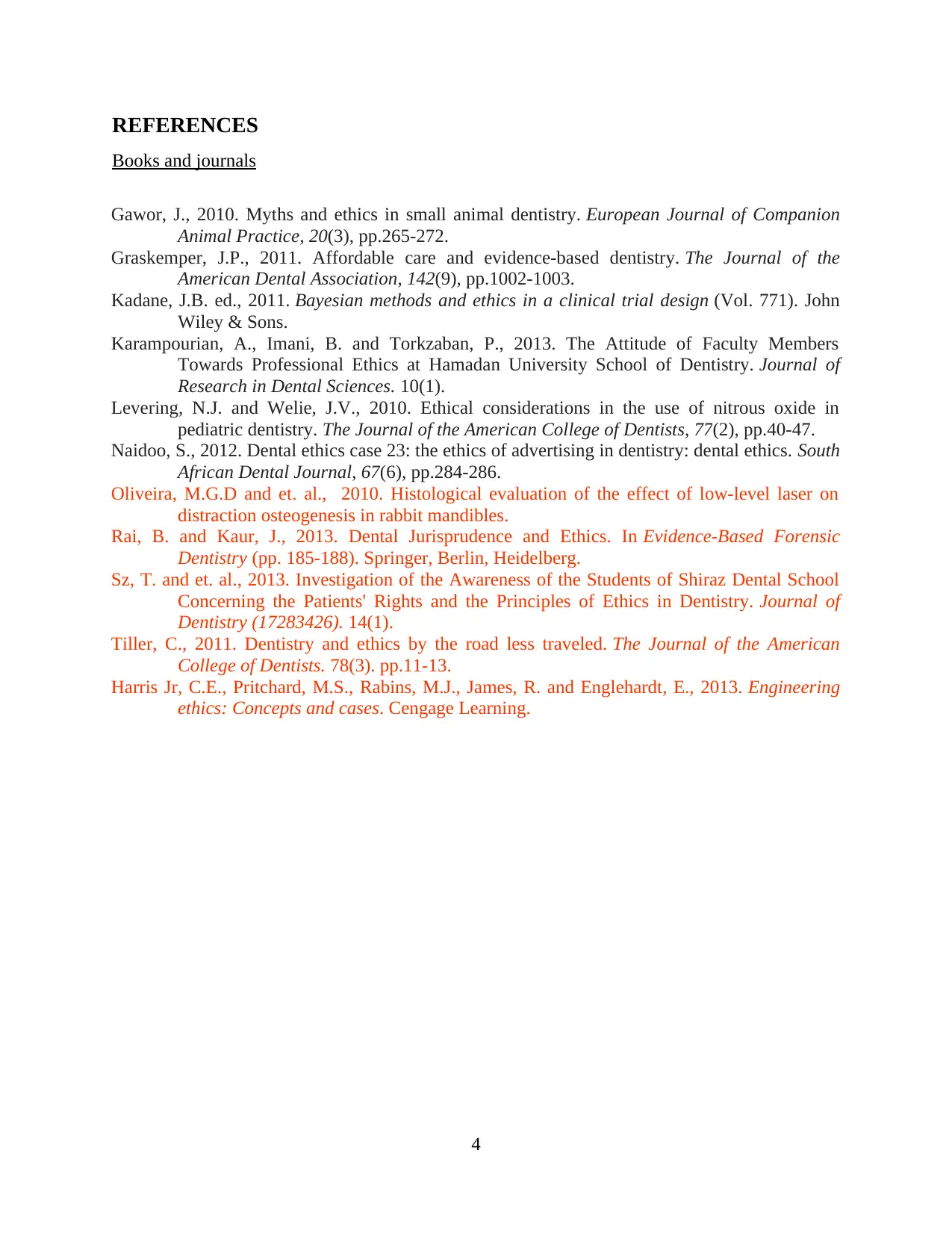
REFERENCES
Books and journals
Gawor, J., 2010. Myths and ethics in small animal dentistry. European Journal of Companion
Animal Practice, 20(3), pp.265-272.
Graskemper, J.P., 2011. Affordable care and evidence-based dentistry. The Journal of the
American Dental Association, 142(9), pp.1002-1003.
Kadane, J.B. ed., 2011. Bayesian methods and ethics in a clinical trial design (Vol. 771). John
Wiley & Sons.
Karampourian, A., Imani, B. and Torkzaban, P., 2013. The Attitude of Faculty Members
Towards Professional Ethics at Hamadan University School of Dentistry. Journal of
Research in Dental Sciences. 10(1).
Levering, N.J. and Welie, J.V., 2010. Ethical considerations in the use of nitrous oxide in
pediatric dentistry. The Journal of the American College of Dentists, 77(2), pp.40-47.
Naidoo, S., 2012. Dental ethics case 23: the ethics of advertising in dentistry: dental ethics. South
African Dental Journal, 67(6), pp.284-286.
Oliveira, M.G.D and et. al., 2010. Histological evaluation of the effect of low-level laser on
distraction osteogenesis in rabbit mandibles.
Rai, B. and Kaur, J., 2013. Dental Jurisprudence and Ethics. In Evidence-Based Forensic
Dentistry (pp. 185-188). Springer, Berlin, Heidelberg.
Sz, T. and et. al., 2013. Investigation of the Awareness of the Students of Shiraz Dental School
Concerning the Patients' Rights and the Principles of Ethics in Dentistry. Journal of
Dentistry (17283426). 14(1).
Tiller, C., 2011. Dentistry and ethics by the road less traveled. The Journal of the American
College of Dentists. 78(3). pp.11-13.
Harris Jr, C.E., Pritchard, M.S., Rabins, M.J., James, R. and Englehardt, E., 2013. Engineering
ethics: Concepts and cases. Cengage Learning.
4
Books and journals
Gawor, J., 2010. Myths and ethics in small animal dentistry. European Journal of Companion
Animal Practice, 20(3), pp.265-272.
Graskemper, J.P., 2011. Affordable care and evidence-based dentistry. The Journal of the
American Dental Association, 142(9), pp.1002-1003.
Kadane, J.B. ed., 2011. Bayesian methods and ethics in a clinical trial design (Vol. 771). John
Wiley & Sons.
Karampourian, A., Imani, B. and Torkzaban, P., 2013. The Attitude of Faculty Members
Towards Professional Ethics at Hamadan University School of Dentistry. Journal of
Research in Dental Sciences. 10(1).
Levering, N.J. and Welie, J.V., 2010. Ethical considerations in the use of nitrous oxide in
pediatric dentistry. The Journal of the American College of Dentists, 77(2), pp.40-47.
Naidoo, S., 2012. Dental ethics case 23: the ethics of advertising in dentistry: dental ethics. South
African Dental Journal, 67(6), pp.284-286.
Oliveira, M.G.D and et. al., 2010. Histological evaluation of the effect of low-level laser on
distraction osteogenesis in rabbit mandibles.
Rai, B. and Kaur, J., 2013. Dental Jurisprudence and Ethics. In Evidence-Based Forensic
Dentistry (pp. 185-188). Springer, Berlin, Heidelberg.
Sz, T. and et. al., 2013. Investigation of the Awareness of the Students of Shiraz Dental School
Concerning the Patients' Rights and the Principles of Ethics in Dentistry. Journal of
Dentistry (17283426). 14(1).
Tiller, C., 2011. Dentistry and ethics by the road less traveled. The Journal of the American
College of Dentists. 78(3). pp.11-13.
Harris Jr, C.E., Pritchard, M.S., Rabins, M.J., James, R. and Englehardt, E., 2013. Engineering
ethics: Concepts and cases. Cengage Learning.
4
⊘ This is a preview!⊘
Do you want full access?
Subscribe today to unlock all pages.

Trusted by 1+ million students worldwide
1 out of 6
Related Documents
Your All-in-One AI-Powered Toolkit for Academic Success.
+13062052269
info@desklib.com
Available 24*7 on WhatsApp / Email
![[object Object]](/_next/static/media/star-bottom.7253800d.svg)
Unlock your academic potential
Copyright © 2020–2026 A2Z Services. All Rights Reserved. Developed and managed by ZUCOL.





